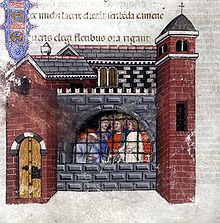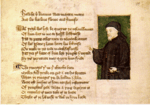- Dream vision
-
Contents
A dream vision is a literary device in which a dream is recounted for a specific purpose. While dreams occur frequently throughout the history of literature, the dream vision emerged as a poetic genre in its own right, and was particularly popular in the Middle Ages. This genre typically follows a structure whereby a narrator recounts his experience of falling asleep, dreaming, and waking. The dream, which forms the subject of the poem, is prompted by events in his waking life that are referred to early in the poem. The ‘vision’ addresses these waking concerns through the possibilities of the imaginative landscapes offered by the dream-state. In the course of the dream, the narrator, often with the aid of a guide, is offered perspectives that provide potential resolutions to his waking concerns. The poem concludes with the narrator waking, determined to record the dream – thus producing the poem.
The dream-vision convention was widely used in European literature from late Latin times until the fifteenth century.
Authors and works
Latin
- Alain de Lille, "De planctu naturae"
- Augustine of Hippo, "Soliloquia"
- Boethius, De consolatione philosophiae
- Cicero, Dream of Scipio
- Macrobius, Commentary on Cicero's Dream of Scipio
- Brother Marcus, Visio Tnugdali, or The Vision of Tundale.
French
- Guillaume de Lorris and Jean de Meun, Roman de la rose, also translated into Middle English by Geoffrey Chaucer
- Marie de France, The Legend of the Purgatory of St. Patrick
- Le Chemin de Povreté et de Richesse, a 14th c. dream poem incorporated in Le Ménagier de Paris
Irish
- The aisling is a genre of dream poetry in Irish literature.
Italian
- Dante Alighieri, The Divine Comedy – exemplifies the conventions of dream-vision literature, though Dante specifically says that his Comedy is not a dream vision.
Old English
- Bede, Vision of Drycthelm
- Anonymous, The Dream of the Rood – the guide in Dream of the Rood is the Cross on which Christ was crucified.
Middle English
- Geoffrey Chaucer, Legend of Good Women, House of Fame, Book of the Duchess, Parliament of Fowls – The Parliament of Fowls features a dream vision in which the narrator falls asleep while reading the Dream of Scipio and is ushered into a walled garden. He is chaperoned in the dream briefly by Scipio the Elder himself.
- William Langland, Piers Plowman or Visio Willelmi de Petro Ploughman (William's Vision of Piers Plowman) is an apocalyptic Middle English allegorical narrative attributed to William Langland, one of the great works of English literature. It is written in unrhymed alliterative verse divided into sections called "passus" (Latin for "step").
- Anonymous, Parlement of the Thre Ages
- Anonymous, Wynnere and Wastoure
- Pearl Poet, Pearl
- The Vision of Tundale – from the Latin Visio Tnugdali.
Welsh
- Anonymous, The Dream of Rhonabwy – possibly a satire on the medieval dream vision
- Anonymous, The Dream of Macsen Wledig
Categories:- Visionary literature
- Literature stubs
Wikimedia Foundation. 2010.




